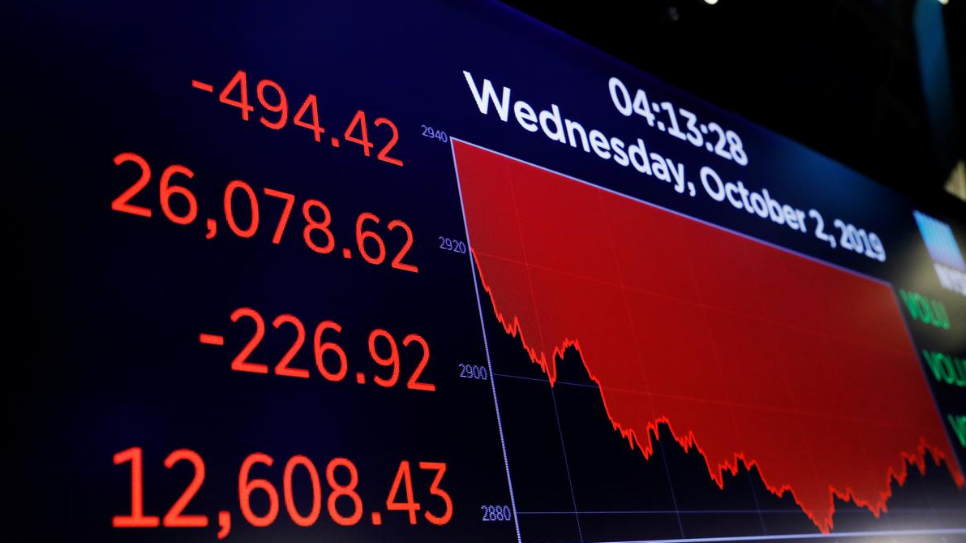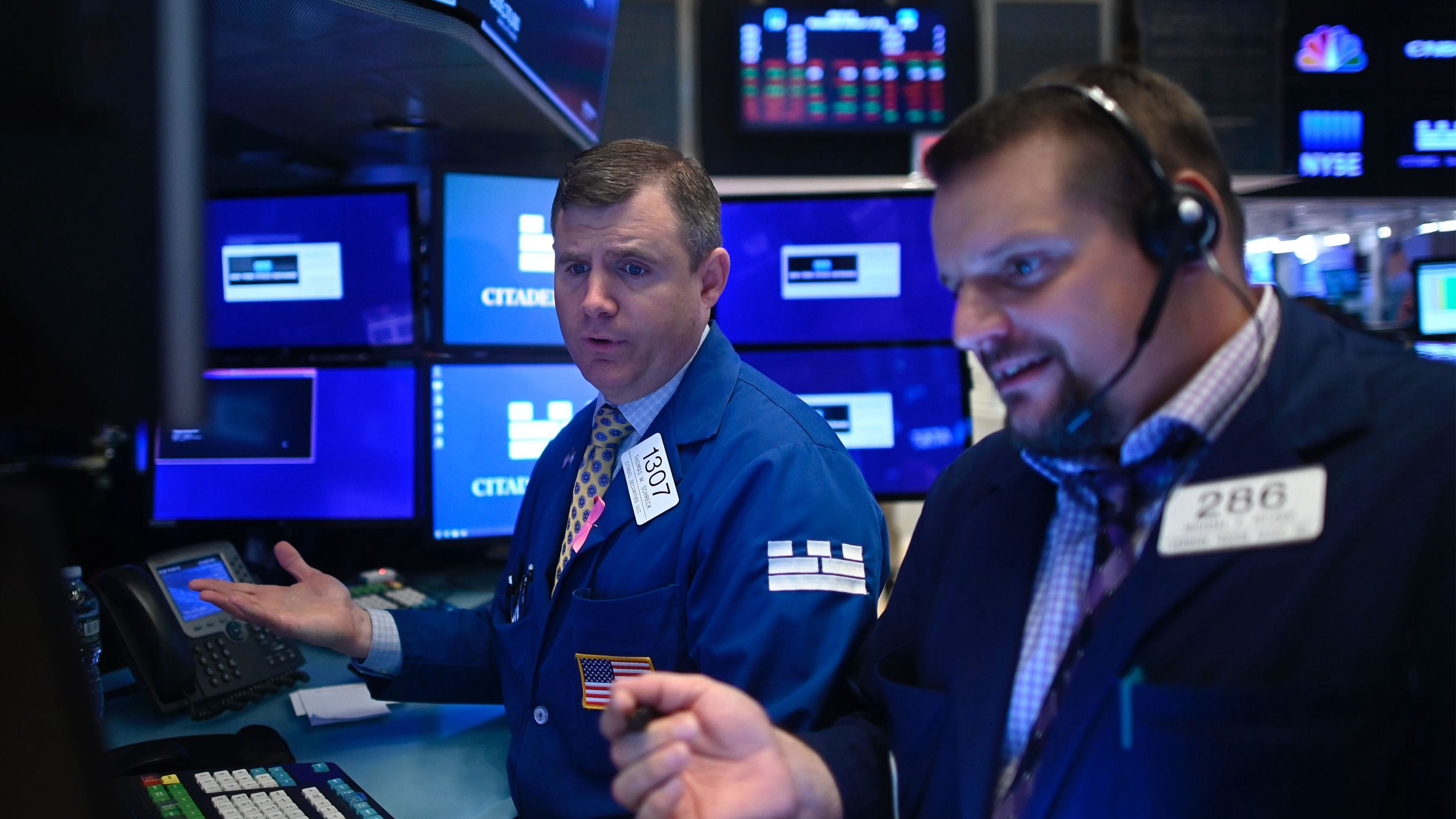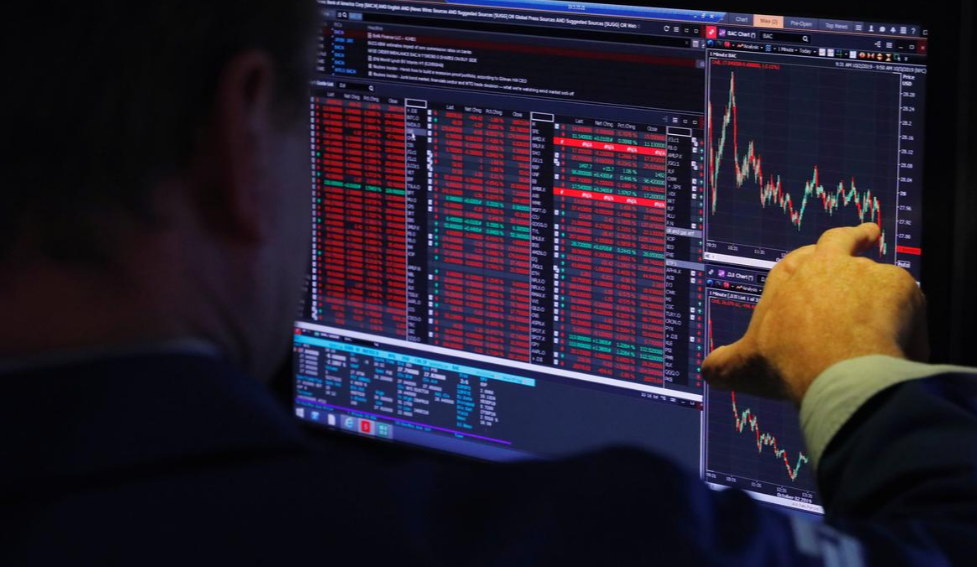
Wall Street's main indexes suffered their sharpest one-day declines in nearly six weeks on Wednesday after weak employment and manufacturing data take an increasing toll on the U.S. economy.
Adding to trade concerns, the United States won approval on Wednesday to levy import tariffs on 7.5 billion U.S. dollars worth of European goods over illegal EU subsidies handed to Airbus, threatening to trigger a tit-for-tat transatlantic trade war.
All 11 major S&P sector indexes fell, with energy and financials each down more than two percent.
The ADP National Employment Report showed private payrolls growth in August was not as strong as previously estimated, and said "businesses have turned more cautious in their hiring," with small enterprises becoming "especially hesitant."
That added to fears sparked on Tuesday when a report showed U.S. factory activity contracted to its lowest level in more than a decade.
"The fact the manufacturing side of the economy in the U.S. and globally is doing badly shouldn't come as a newsflash to anybody. But the extent of the miss yesterday is something that's driven this two-day move," said Greg Boutle, head of U.S. equity and derivative strategy at BNP Paribas.

Traders work during the opening bell at the New York Stock Exchange (NYSE) on October 2, 2019 at Wall Street in New York City. /VCG Photo
Traders work during the opening bell at the New York Stock Exchange (NYSE) on October 2, 2019 at Wall Street in New York City. /VCG Photo
The recent weak data has shaken investor faith in the strength of the domestic economy, which had shown relative resilience in the face of slowing global growth. Confidence in the U.S. economy has helped support Wall Street this year.
"If China buys less from us, we have less to manufacture, fewer orders to fill. This data is indicating we are not immune to this trade dispute, that it's hurting us as well as China," said Sam Stovall, chief investment strategist at CFRA Research.
The focus is now on the U.S. Labor Department's more comprehensive jobs report on Friday for further clues on the health of the U.S. economy.
The S&P 500 and the Dow slipped below their 100-day moving averages for the first time in about a month. Many investors believe that falling below such moving averages means the indexes are likely to fall further.
The S&P 500 is now about five percent below its all-time high hit in July after coming within striking distance of the mark two weeks ago. Over the past 12 months, the S&P 500 is down about one percent.
The Dow Jones Industrial Average dropped 1.86 percent to end at 26,078.62 points, while the S&P 500 lost 1.79 percent to 2,887.61.
The Nasdaq Composite fell 1.56 percent to 7,785.25.
Volume on U.S. exchanges was 8.0 billion shares, compared with the 7.3 billion average for the full session over the last 20 trading days.

The Cboe Volatility Index, or VIX, an options-based gauge of investor anxiety, rose 1.9 points to 20.47, its highest in about a month.
Activision Blizzard Inc dropped 1.2 percent after Bernstein downgraded the videogame maker's shares to "market perform."
Ford Motor Co shares fell 3.3 percent after the carmaker reported a fall of about five percent in U.S. auto sales for the third quarter. General Motors Co slumped 4.0 percent after its quarterly sales came in slightly short of U.S. car shopping website Edmunds' forecast.
Among bright spots, homebuilder Lennar Corp rose 3.8 percent after the company reported a better-than-expected profit as cheaper mortgage rates led to higher demand for its homes.
Johnson & Johnson gained 1.5 percent after the drugmaker said it will pay 20 million U.S. dollars to settle claims by two Ohio counties, allowing it to avoid an upcoming federal trial seeking to hold the industry responsible for the nation's opioid epidemic.
Declining issues outnumbered advancing ones on the NYSE by a 3.56-to-1 ratio; on Nasdaq, a 2.75-to-1 ratio favored decliners.
The S&P 500 posted three new 52-week highs and 13 new lows; the Nasdaq Composite recorded four new highs and 182 new lows.
(Cover: A board showing the final trading numbers of the day hangs above the floor of the New York Stock Exchange shortly after the closing bell in New York, October 2, 2019. /Reuters Photo)
Source(s): Reuters